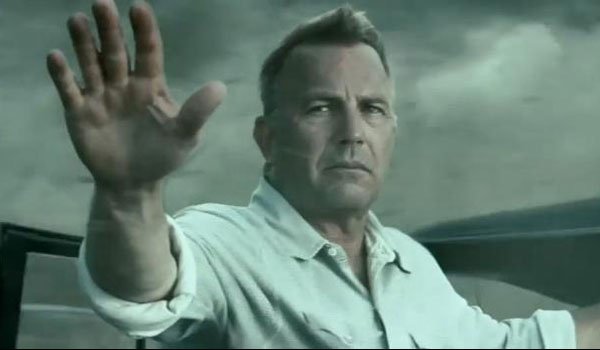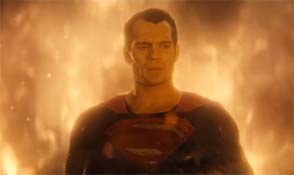Which is weird, because BvS has some of the most blatant thematic statements since the first Magnificent Seven.
In one of the very first scenes, Lois Lane has journeyed to interview a rebellious warlord, and her photographer is found to have brought a CIA transmitter. Before being executed, he insists that Lois was a dupe and had no idea.
The warlord's lieutenant turns to the camera and says "Ignorance is not innocence."


It's a really direct metaphysical statement that's totally out of place for the scene and hard to ignore.
***
Halfway through the movie, Clark has a dreamlike scene where he talks to the late Pa Kent, who rambles a story about when a flood hit the farm when he was a kid, and he helped dig a channel to direct the water away. His family celebrated him, while unbeknownst to him the water just went to another farm and drowned their horses. He holds intense guilt for this.


This is not a fight scene. There is no flashy CGI shown off. No comic book plots are advanced. This isn't an excuse to show off overpaid actors (unless you think modern audiences were demanding scenery porn with Kevin Costner in it.) Snyder basically took five minutes out of the movie to tell a story who's only moral was "ignorance is not innocence."
... can anyone find a single review that mentions this theme and how it relates to the movie? Hell, you could say that BvS fails to address this theme in any way except the most ham-handed sentences, at least you'd be addressing the work.
***
After the rebel warlord scene, a congressional committee calls witnesses to discuss Superman's one-man toppling of this military force. The government was able to sweep in and take back control, killing many innocent villagers. They're not criticizing that Superman knowingly (probably) killed a man, but the after effects to the delicate situation he was holding up. Superman could say he didn't know, but...
***
The most controversial scene is not anything to do with the title Fight. It's when a terrorist bomb blows up a congressional inquiry, and Superman just stands in the middle of it looking sad.

It's a beautiful shot. It begs of us "what is he thinking?" What does Superman feel at the moment of a catastrophe that he failed to stop?
He's thinking he could have stopped this.
He could have looked for a bomb, even in the chairs of distinguished guests.
He could have suspected Wally as a terrorist.
He could have looked into the man crippled by his fight in Metropolis, who later vandalized his statue. [1]
He could have paid more attention to the poor and lost.
It's an extremely heavy burden to bear.
This is not a light moral principle to just throw off. This is not "it's important to be nice to people, and death is bad." Saying people are responsible for things they do not know about gives all of us a terrifying burden, one people will fight to not accept. A piece of art has to make that argument to us.
It's certainly an argument with economic implications, as any rationalist or leftist would tell you. Just because you do not know about starving children in Africa or abused workers in Foxxconn, does not make you innocent of their oppression.
***
Ignorance is not innocence, is anmoral ethical principle particularly important to Superman. (We'll go into the difference between ethics and morals next week when I talk about the sitcom Seinfeld.)
Superman has always been associated with two professions: journalism, and the military. (Snarky fans who ask why Superman is a reporter when he could like, perform X-rays, are as ignorant of the thematic meanings as those who ask why does Bruce Wayne fight crime instead of dedicating his fortune to helping the poor and sick.[2]) Clark is a reporter, and Superman's government contacts are almost always through generals. His love interest is Lois Lane, a journalist who just happens to be the daughter of a general who can provide convenient plot hooks. His powers are ones of information collection, and absolute force. He is usually reactive instead of proactive, like both institutions. He ends wars he does not start them.[3]
He embodies the journalistic responsibility to know, and the military's responsibility to respond.
One of the iconic images authors love to return to of Superman is when he opens his ears up and listens to everything he can hear, the millions of voices needing help, or just their banal existence. When the audience sees that, they are put in touch with the terrifying burden of responsibility Superman carries at all times. He could turn it off, but being ignorant of those voices would not make him innocent.
***
Batman related footnotes!
[1] Immediately after Wally's suicide-bombing, Bruce Wayne looks into what happened to all the disability checks sent to him, and sees they were returned and vandalized. He demands why didn't anybody tell him!
[2] The answer is: he does. So does Bill Gates. You'll notice widespread suffering has not stopped, and we still want answers to questions like "why do bad things happen to good people." These myths are our attempts to deal with those fundamental questions.
[3] In comparison, Batman is associated with the professions of detective and CEO, and is proactive like they are expected to be. How many Batman storylines start with "Bruce has been investigating this for months?"

It's a beautiful shot. It begs of us "what is he thinking?" What does Superman feel at the moment of a catastrophe that he failed to stop?
He's thinking he could have stopped this.
He could have looked for a bomb, even in the chairs of distinguished guests.
He could have suspected Wally as a terrorist.
He could have looked into the man crippled by his fight in Metropolis, who later vandalized his statue. [1]
He could have paid more attention to the poor and lost.
It's an extremely heavy burden to bear.
This is not a light moral principle to just throw off. This is not "it's important to be nice to people, and death is bad." Saying people are responsible for things they do not know about gives all of us a terrifying burden, one people will fight to not accept. A piece of art has to make that argument to us.
It's certainly an argument with economic implications, as any rationalist or leftist would tell you. Just because you do not know about starving children in Africa or abused workers in Foxxconn, does not make you innocent of their oppression.
***
Ignorance is not innocence, is an
Superman has always been associated with two professions: journalism, and the military. (Snarky fans who ask why Superman is a reporter when he could like, perform X-rays, are as ignorant of the thematic meanings as those who ask why does Bruce Wayne fight crime instead of dedicating his fortune to helping the poor and sick.[2]) Clark is a reporter, and Superman's government contacts are almost always through generals. His love interest is Lois Lane, a journalist who just happens to be the daughter of a general who can provide convenient plot hooks. His powers are ones of information collection, and absolute force. He is usually reactive instead of proactive, like both institutions. He ends wars he does not start them.[3]
He embodies the journalistic responsibility to know, and the military's responsibility to respond.
One of the iconic images authors love to return to of Superman is when he opens his ears up and listens to everything he can hear, the millions of voices needing help, or just their banal existence. When the audience sees that, they are put in touch with the terrifying burden of responsibility Superman carries at all times. He could turn it off, but being ignorant of those voices would not make him innocent.
***
Batman related footnotes!
[1] Immediately after Wally's suicide-bombing, Bruce Wayne looks into what happened to all the disability checks sent to him, and sees they were returned and vandalized. He demands why didn't anybody tell him!
[2] The answer is: he does. So does Bill Gates. You'll notice widespread suffering has not stopped, and we still want answers to questions like "why do bad things happen to good people." These myths are our attempts to deal with those fundamental questions.
[3] In comparison, Batman is associated with the professions of detective and CEO, and is proactive like they are expected to be. How many Batman storylines start with "Bruce has been investigating this for months?"
No comments:
Post a Comment